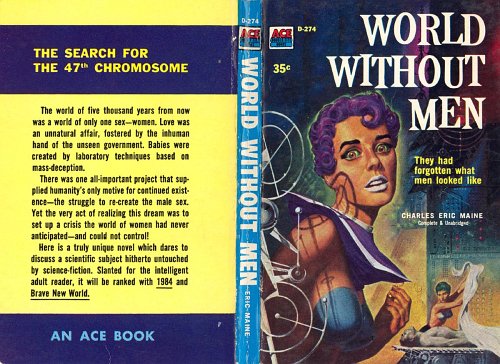The blurb on the thirty-five cent Ace paperback likens Charles Eric Maine’s 1958 novel World without Men to George Orwell’s 1984 and Aldous Huxley’sBrave New World. Ordinarily – and in consideration of the genre and the lurid cover – one would regard such a comparison skeptically. Nevertheless, while not rising to the artistic level of the Orwell and Huxley masterpieces, World without Men merits being rescued from the large catalogue of 1950s paperback throwaways, not least because of Maine’s vision of an ideological dystopia is based on criticism, not of socialism or communism per se nor of technocracy per se, but rather of feminism. Maine saw in the nascent feminism of his day (the immediate postwar period) a dehumanizing and destructive force, tending towards totalitarianism, which had the potential to deform society in radical, unnatural ways. Maine grasped that feminism – the dogmatic delusion that women are morally and intellectually superior to men – derived its fundamental premises from hatred of, not respect for, the natural order; he grasped also that feminism entailed a fantastic rebellion against sexual dimorphism, which therefore also entailed a total rejection of inherited morality. World Without Men: The Forgotten Novel of Totalitarian Lesbiocracy by Charles Eric Maine

Misunderstood Promises
 participants of Communist Cambodia’s efforts to commit self-genocide. Today everybody condemns Duch. His party affiliation, which is as relevant for the crime as, is his person, however, gets little mention. Except perhaps that, the talk is about “stone-age Communism. The term implies an excuse. It insinuates that people such as Duch have somehow abandoned the real humanistic party line. Accepting the killer’s condemnation has a related reason. It helps to avoid the kind of look in the mirror that would bring the past and its record back.
participants of Communist Cambodia’s efforts to commit self-genocide. Today everybody condemns Duch. His party affiliation, which is as relevant for the crime as, is his person, however, gets little mention. Except perhaps that, the talk is about “stone-age Communism. The term implies an excuse. It insinuates that people such as Duch have somehow abandoned the real humanistic party line. Accepting the killer’s condemnation has a related reason. It helps to avoid the kind of look in the mirror that would bring the past and its record back.
The Dangers Of An Excessive Economic Role Of The State

Wednesday, 18 August 2010
From the desk of Thomas F. Bertonneau on Tue, 2010-08-17 13:12
From the desk of George Handlery on Sat, 2010-08-14 13:34
1. After a delay of several decades, Comrade Duch has been convicted. The man was one of
From the desk of George Handlery on Sat, 2010-08-07 13:22
Posted by
Britannia Radio
at
09:14
![]()





















